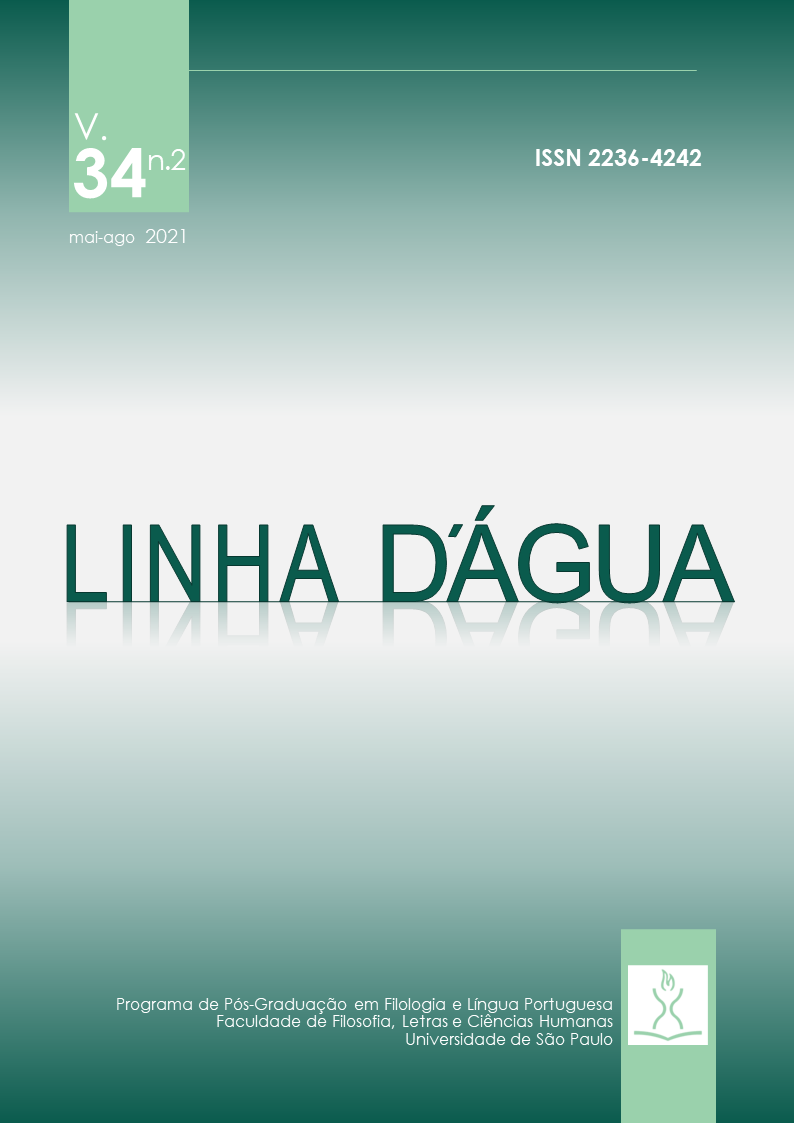Terminologia e organização do conhecimento: linguagens, vocabulários e sistemas
DOI:
https://doi.org/10.11606/issn.2236-4242.v34i2p26-46Palavras-chave:
Sistemas de organização de conhecimento, Vocabulários controlados, Linguagens documentais, Recursos terminológicos, SKOSResumo
Este artigo parte do pressuposto de que as ferramentas utilizadas para a organização do conhecimento (tesauros, esquemas de classificação, etc.) podem ser entendidas como recursos terminológicos. Abordamos as relações entre terminologia e organização do conhecimento, assumindo um ponto de vista baseado na bidimensionalidade (linguística e conceptual) da terminologia enquanto disciplina. Em seguida, propomos uma análise dos conceitos subjacentes às designações “linguagem documental”, “vocabulário controlado” e “sistema de organização do conhecimento” nos textos de especialidade. Terminamos com a descrição do SKOS (Simple Knowledge Organization System), um modelo para a representação de sistemas de organização do conhecimento na web semântica, o qual é avaliado em termos da sua capacidade de modelizar recursos terminológicos de acordo com a abordagem bidimensional à terminologia e os principais elementos da norma ISO 1087.
Downloads
Referências
ALMEIDA, B.; COSTA, R. OntoAndalus: an ontology of Islamic artefacts for terminological purposes. Semantic Web Journal, v. 12, n. 2, p. 295–311, 2021.
ALMEIDA, B.; COSTA, R.; ROCHE, C. The names of lighting artefacts: extraction and representation of Portuguese and Spanish terms in the archaeology of al-Andalus. Revue TAL, v. 60, n. 3, p. 113–137, 2019.
ALMEIDA, B.; FREIRE, N.; MONTEIRO, D. The development of the ROSSIO Thesaurus: supporting content discovery and management in a research infrastructure. DOSSO, D.; FERILLI, S.; MANGHI, P.; POGGI, A.; SERRA, G.; SILVELLO, G. In: (Eds.). Proceedings of the 17th Italian Research Conference on Digital Libraries. Aachen: CEUR-WS, 2021. Disponível em: http://ceur-ws.org/Vol-2816/ Acesso em: 06 jul. 2021.
ÁREA DE CLASSIFICAÇÃO E INDEXAÇÃO DA BIBLIOTECA NACIONAL. SIPORbase: Sistema de Indexação em Português : manual. 3a ed. rev. e aumentada. Lisboa: Biblioteca Nacional, 1998.
BAKER, T.; BECHHOFER, S.; ISAAC, A.; MILES, A.; SCHREIBER, G.; SUMMERS, S. Key Choices in the Design of Simple Knowledge Organization System (SKOS). Journal of Web Semantics, v. 20, p. 35–49, maio 2013.
BOWKER, L.; PEARSON, J. Working with specialized language : a practical guide to using corpora. London: Routledge, 2002.
BRATKOVÁ, E.; KUČEROVÁ, H. Knowledge Organization Systems and Their Typology. Revue of Librarianship, v. 25, n. 2, p. 1–25, 2014.
CABRÉ, M. T. Terminologie et linguistique : la théorie des portes. Terminologies nouvelles, n. 21, p. 10–15, 2000.
CABRÉ, M. T. Theories of terminology: their description, prescription and explanation. Terminology, v. 9, n. 2, p. 163–199, 2003.
CABRÉ, M. T. La teoría comunicativa de la terminología: una aproximación lingüística a los términos. Revue française de linguistique appliquée, v. 14, n. 2, p. 9–15, 2009.
CAMPOS, M. L. A. Linguagem documentária: teorias que fundamentam sua elaboração. Niterói: Universidade Federal Fluminense, 2001.
COSTA, R. Plurality of theoretical approaches to terminology. In: PICHT, H. (Ed.). Modern approaches to terminological theories and applications. Bern: Peter Lang, 2006. p. 79–89.
COSTA, R. Terminology and specialised lexicography: two complementary domains. Lexicographica, v. 29, n. 1, p. 29–42, 2013.
COSTA, R.; SILVA, R.; CAMPOS, M. I. B. Terminologia, uma disciplina de interfaces. Linha d’Água, v. 33, n. 1, p. 1–8, abr. 2020.
DAHLBERG, I. A referent-oriented, analytical concept theory for INTERCONCEPT. International Classification, v. 5, n. 3, p. 142–151, 1978.
DAHLBERG, I. Knowledge organization and terminology: philosophical and linguistic bases. International Classification, v. 19, n. 2, p. 65–71, 1992.
DAHLBERG, I. Brief communication: Concepts and terms - ISKO’s major challenge. Knowledge Organization, v. 36, n. 2/3, p. 169–177, 2009.
FABER, P. (Ed.). A cognitive linguistics view of terminology and specialized language. Berlin: De Gruyter Mouton, 2012.
FELBER, H. Terminology manual. Paris: UNESCO, 1984.
FILLMORE, C. J. Frames and the semantics of understanding. Quaderni di semantica, v. 6, n. 2, p. 222–254, dez. 1985.
GUARINO, N.; OBERLE, D.; STAAB, S. What is an ontology? In: STAAB, S.; STUDER, R. (Eds.). Handbook on ontologies. Second ed. Berlin: Springer, 2009. p. 1–17.
HARPRING, P. Introduction to controlled vocabularies: terminology for art, architecture, and other cultural works. Los Angeles: Getty Research Institute, 2010.
HITZLER, P.; KRÖTZSCH, M.; RUDOLPH, S. Foundations of semantic web technologies. Boca Raton: CRC Press, 2010.
HJØRLAND, B. What is Knowledge Organization (KO)? Knowledge Organization, v. 35, n. 2/3, p. 86–101, 2008.
HJØRLAND, B. Concept theory. Journal of the American Society for Information Science and Technology, v. 60, n. 8, p. 1519–1536, 2009.
HODGE, G. Systems of Knowledge Organization for Digital Libraries: Beyond Traditional Authority Files. [S.l.] Council on Library and Information Resources, 2000.
ISO 704. Terminology work – Principles and methods. Geneva: ISO, 2009.
ISO 1087. Terminology work and terminology science – Vocabulary. Geneva: ISO, 2019.
ISO 5127. Information and documentation - Foundation and vocabulary. Geneva: ISO, 2017.
ISO 25964-1. Information and documentation - Thesauri and interoperability with other vocabularies - Part 1: Thesauri for information retrieval. Geneva: ISO, 2011.
ISO 25964-2. Information and documentation - Thesauri and interoperability with other vocabularies - Part 2: Interoperability with other vocabularies. Geneva: ISO, 2013.
LAKOFF, G. Women, fire and dangerous things: what categories reveal about the mind. Chicago: University of Chicago Press, 1987.
LAKOFF, G.; JOHNSON, M. Metaphors we live by. Chicago: University of Chicago Press, 1980.
MELBY, A. K. Terminology in the age of multilingual corpora. The Journal of Specialised Translation, n. 18, p. 7–29, jul. 2012.
MOREIRO GONZÁLEZ, J. A. Linguagens documentárias e vocabulários semânticos para a web: elementos conceituais. Salvador: EDUFBA, 2011.
NP 4285-4. Documentação e informação - Vocabulário - Parte 4: Linguagens documentais. Caparica: IPQ, 2000.
NUOPPONEN, A. Tangled web of concept relations: concept relations for ISO 1087-1 and ISO 704. TKE 2014: Ontology, Terminology & Text Mining, n. p., jun. 2014.
ROCHE, C. Terme et concept : fondements pour une ontoterminologie. TOTh 2007. Annecy: Institut Porphyre, 2007.
SAGER, J. C. A practical course in terminology processing. Amsterdam: John Benjamins, 1990.
SANTOS, C.; COSTA, R. Domain specificity: semasiological and onomasiological knowledge representation. In: KOCKAERT, H. J.; STEURS, F. (Eds.). Handbook of terminology. Amsterdam: John Benjamins, 2015. v. 1, p. 153–179.
SILVA, R. Gestão de terminologia pela qualidade: processos de validação. Tese de doutoramento - Universidade NOVA de Lisboa, Lisboa, 2014.
SOUZA, R. R.; TUDHOPE, D.; ALMEIDA, M. B. Towards a taxonomy of KOS: Dimensions for Classifying Knowledge Organization Systems. Knowledge Organization, v. 39, n. 3, p. 179–192, jan. 2012.
TEMMERMAN, R. Towards new ways of terminology description: the sociocognitive approach. Amsterdam: John Benjamins, 2000.
WIERZBICKA, A. Semantics: primes and universals. Oxford: Oxford University Press, 1996.
WÜSTER, E. Introduction to the general theory of terminology and terminological lexicography. Vienna: Springer, 1979.
ZENG, M. Knowledge Organization Systems (KOS). Knowledge Organization, v. 35, n. 2/3, p. 160–182, 2008.
Publicado
Edição
Seção
Licença
Copyright (c) 2021 Bruno Almeida

Este trabalho está licenciado sob uma licença Creative Commons Attribution-NonCommercial 4.0 International License.
A aprovação dos manuscritos implica cessão imediata e sem ônus dos direitos de publicação para a Linha D'Água. Os direitos autorais dos artigos publicados pertencem à instituição a qual a revista encontra-se vinculada. Em relação à disponibilidade dos conteúdos, a Linha D'Água adota a Licença Creative Commons, CC BY-NC Atribuição não comercial. Com essa licença é permitido acessar, baixar (download), copiar, imprimir, compartilhar, reutilizar e distribuir os artigos, desde que para uso não comercial e com a citação da fonte, conferindo os devidos créditos autorais à revista.
Nesses casos, em conformidade com a política de acesso livre e universal aos conteúdos, nenhuma permissão é necessária por parte dos autores ou do Editor. Em quaisquer outras situações a reprodução total ou parcial dos artigos da Linha D'Água em outras publicações, por quaisquer meios, para quaisquer outros fins que sejam natureza comercial, está condicionada à autorização por escrito do Editor.
Reproduções parciais de artigos (resumo, abstract, resumen, partes do texto que excedam 500 palavras, tabelas, figuras e outras ilustrações) requerem permissão por escrito dos detentores dos direitos autorais.
Reprodução parcial de outras publicações
Citações com mais de 500 palavras, reprodução de uma ou mais figuras, tabelas ou outras ilustrações devem ter permissão escrita do detentor dos direitos autorais do trabalho original para a reprodução especificada na revista Linha D'Água. A permissão deve ser endereçada ao autor do manuscrito submetido. Os direitos obtidos secundariamente não serão repassados em nenhuma circunstância.











